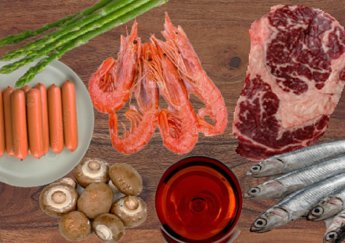What Is Gouty Arthritis??
Gout is a type of arthritis caused by high uric acid levels in the blood, which can form crystals (mon-sodium-urate) in the joints.
This leads to sudden episodes of severe pain, swelling, redness, and warmth in joints. It most often affects the big toe but can also occur in the ankles, knees, wrists, and other joints. These attacks are often triggered by high-purine foods, alcohol, dehydration, or other health conditions.
Without proper treatment and lifestyle changes, gouty arthritis can become chronic and damage the joints over time.

What Foods to Avoid in Gout Patients?
✅ One of the most important dietary steps for gout patients is to avoid red meats such as beef, lamb, and pork, which are high in purines. Add skinless chicken, turkey, plant-based proteins such as tofu, lentils in moderation as safe alternatives.
✅ Organ meats like liver, kidney, and sweetbreads (pancreas and thymus) are especially harmful because they have extremely high purine content. Instead, use lean poultry, eggs, legumes in small amounts.
✅ Seafood such as anchovies, sardines, mackerel, herring, tuna, scallops, and shellfish should be avoided or limited, as they can easily raise uric acid levels. Salmon (in moderation), freshwater fish, plant-based omega-3 sources (chia, flaxseeds) can be a safe alternatives.
✅ Alcohol, particularly beer and spirits, can interfere with uric acid elimination and trigger gout flare-ups. Coffee and herbal teas may instead known to decrease serum uric acid levels.
✅ Sugary beverages like soda and fruit juices with high fructose corn syrup also contribute to uric acid buildup. Drink fresh lemon water, coconut water, homemade fresh juices (without added sugar) instead.
✅ Processed foods, fast foods, and snacks high in trans fats and refined carbohydrates can worsen inflammation and overall joint health.
✅ Some vegetables like asparagus, spinach, and mushrooms are moderately high in purines, but they generally have less impact than meat and seafood. Most other vegetables like carrots, cucumber, cabbage, zucchini, etc. consumed liberally.
✅ Limit high-fat dairy products and opt for low-fat alternatives instead such as low-fat milk, yogurt, and some cheese like cottage and ricotta.
✅ In addition, avoiding excessive processed meats like bacon, sausages, and deli meats can reduce the risk of flare-ups.
Keynote
Maintaining a healthy weight, staying hydrated, and eating more fresh fruits, vegetables, and whole grains can help manage gout more effectively.
By following these dietary guidelines and avoiding high-purine foods, gout patients can significantly reduce their symptoms and prevent future attacks. – Medical Disclaimer.
Read further on:
≺≺ Can Physical Activity Help Improve My Arthritis?
≺≺ How common is thumb pain from too much texting?
≺≺ What health problems are linked to consuming corn syrup?
≺≺ What happens to my blood vessels when I gain weight?
≺≺ How are artificial sweeteners made?
≺≺ What are the four enemies of blood sugar?
≺≺ What type of exercise is best for lowering my blood sugar?
≺≺ What impact can sitting for long periods have on my health?
≺≺ Does my social circle impact my weight?
≺≺ How toxic are the nitrites used in curing processed meats?
≺≺ How can I reduce the risk of cancer-causing chemicals when cooking or grilling meat?
≺≺ What foods can lower prostate cancer risk?
≻≻ Watch this page for more such informative articles on Health, Nutrition, and Wellness.
≻≻-Back to Home page.
Further reading (External Links opens in new window):
≺≺- Harvard Health Publishing- Living with gout.
≺≺- Johns Hopkins Medicine- Foods to Avoid With Gout.

